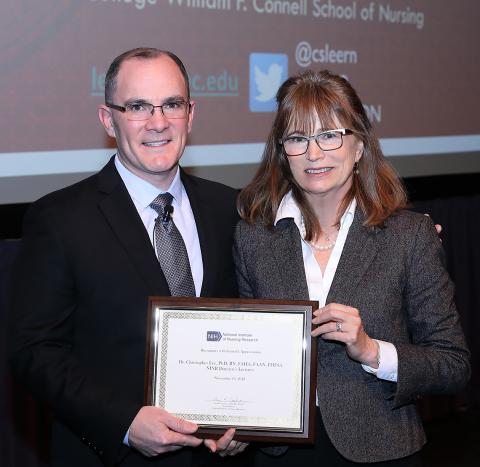Heart Failure
‘Intellectual Family Tree’ Examined in NINR Lecture

Attendees of the NINR Director’s Lecture series are accustomed to learning more about an accomplished nurse scientist’s program of research. Less common, however, is an exercise in examining one’s “intellectual family tree.” Attendees at the recent lecture “Integrative Biobehavioral Research in Heart Failure,” featuring Dr. Christopher Lee, were treated to both.
Lee, professor and associate dean for research at Boston College’s Connell School of Nursing, described his research in heart failure focused on symptom science and patients’ response to symptoms when they occur. The innovative approach to research that Lee calls“biobehavioral profiling” reflects an understanding of biological underpinnings of symptomatology as well as knowledge of advanced statistical techniques, which he uses to better understand differing responses to heart failure and its therapies.
To more succinctly describe his research, Lee quipped that he studies the “human model of heart failure.”
He highlighted studies he and his team have conducted on heart failure self-care management, as well as the symptom science and symptom biology of heart failure.
Notably, Lee and his team studied the impact of the patient/caregiver dyad on self-care management, discovering that a mismatch between how patients and caregivers rate the patient’s symptoms is associated with an increased risk for a cardiac event. Throughout his research on caregiving dyads, Lee noted that caregivers themselves often have serious illnesses of their own. Because of this, he considers the classifications of “patient” and “care partner” to be arbitrary and encourages research focused on the health of the partnership itself—not the health of one valued over the other.
Lee also discovered that what we know about heart failure may not be as straightforward as it would seem. For instance, an increased left ventricular internal diastolic diameter is associated with worse symptoms among heart-failure patients—but only if those patients are men. For women, the opposite is true. Similarly, the biological underpinnings of symptoms can vary depending on the severity of the illness.
Lee described his own intellectual family tree—the mentors from varied fields who together make up his intellectual lineage, as well as those mentees whose work he has influenced. He encouraged audience members to examine who has influenced their own scientific thinking and advised attendees to consider their roles in mentoring relationships.
The NINR Director’s Lecture Series is designed to bring the nation’s top nurse scientists to NIH to share their work and interests with a trans-disciplinary audience. Lee’s lecture is available on NINR’s YouTube channel at https://www.youtube.com/NINRnews.
